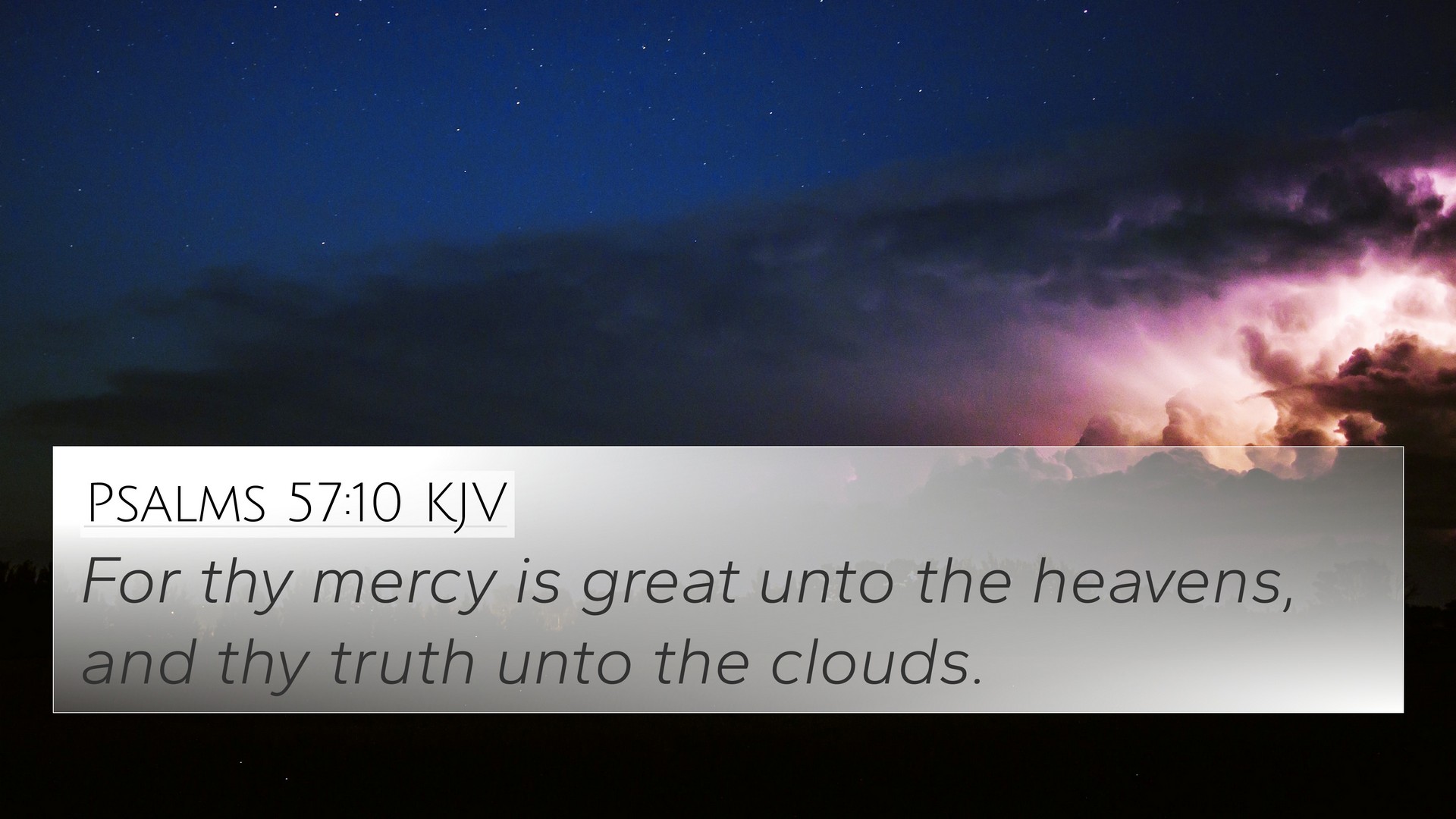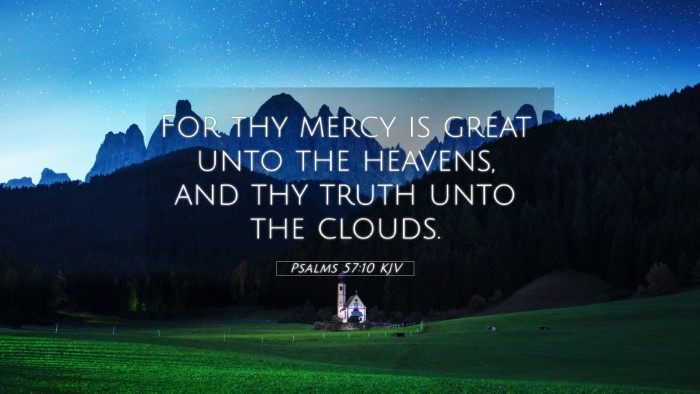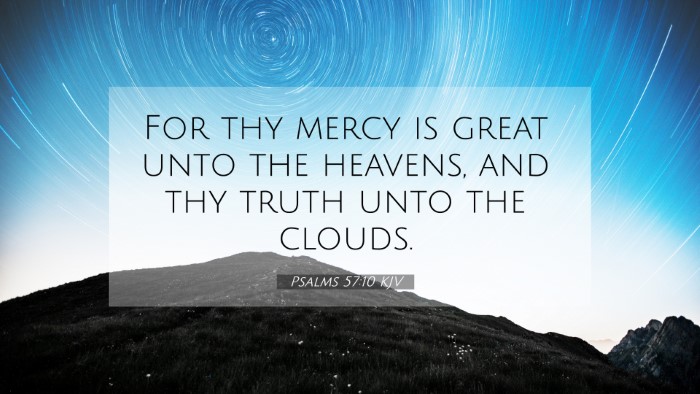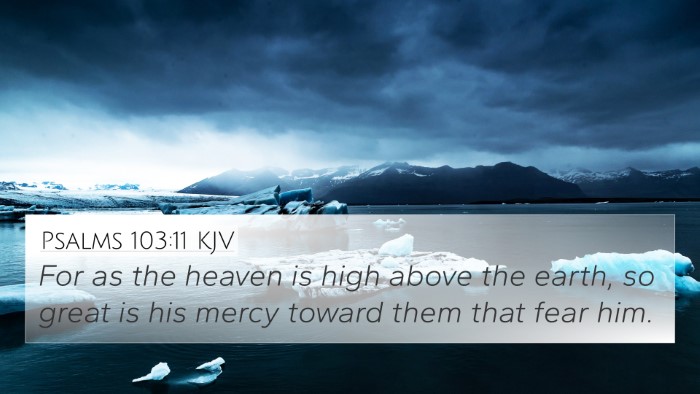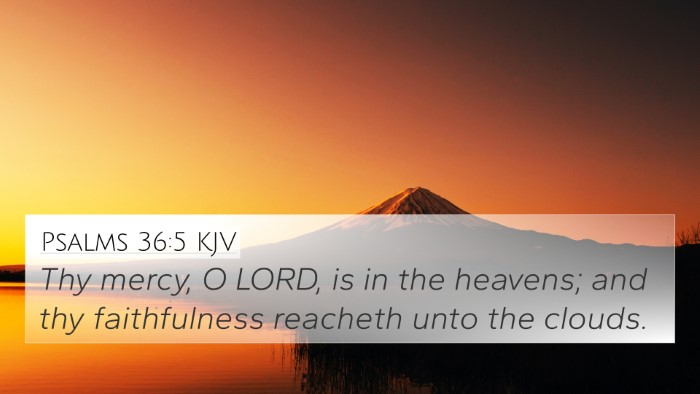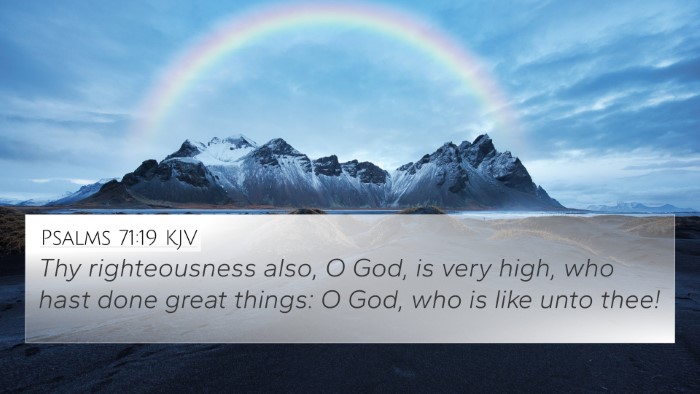Psalms 57:10 - Interpretation and Meaning
Psalms 57:10 states, "For thy mercy is great unto the heavens, and thy truth unto the clouds."
This verse encapsulates a profound acknowledgment of God's unbounded mercy and unwavering truth. In this exploration, we will examine its meaning using insights from various public domain commentaries, while also cross-referencing related Bible verses.
Summary of Psalms 57:10
The verse expresses a deep sense of gratitude toward God's merciful nature, which is described as extending "great unto the heavens." It signifies that God's mercy is limitless, expansive, and transcends human understanding. Additionally, the mention of truth "unto the clouds" suggests that God's truth is high above all earthly situations, asserting that it remains consistent, unshakeable, and ever-present in the fabric of reality.
Commentary Insights
-
Matthew Henry's Commentary:
Henry emphasizes that the psalmist, in a time of distress, magnifies both God's mercy and truth. He draws parallels between God's merciful character and His commitment to truth, suggesting that the believer can find solace in God's promises even amidst turmoil.
-
Albert Barnes' Commentary:
Barnes notes that the psalmist is in a posture of worship and recognition of God's attributes. He highlights how the lyricist contrasts human frailty with divine strength, noting that God's mercy provides refuge and reassurance. Barnes additionally reinforces the idea that God's truth is eternal, unaffected by human circumstances.
-
Adam Clarke's Commentary:
Clarke offers insights into the poetic nature of the psalm, illustrating that the heights of 'heavens' and 'clouds' serve as vivid imagery to express God's divine attributes. Clarke underscores the importance of understanding God's mercy as not just forgiveness, but as a protective and sustaining force.
Cross-References and Related Verses
Understanding Psalms 57:10 can be enhanced by examining related scriptures that echo the themes found within it. Here are some pertinent cross-references:
- Psalms 103:11: "For as the heaven is high above the earth, so great is his mercy toward them that fear him."
- Psalms 108:4: "For thy mercy is great above the heavens: and thy truth reaches unto the clouds."
- Isaiah 55:8-9: "For my thoughts are not your thoughts, neither are your ways my ways, says the Lord. For as the heavens are higher than the earth, so are my ways higher than your ways, and my thoughts than your thoughts."
- Romans 5:20: "Moreover the law entered that the offense might abound. But where sin abounded, grace did much more abound."
- Psalm 36:5: "Thy mercy, O Lord, is in the heavens; and thy faithfulness reaches unto the clouds."
- Numbers 23:19: "God is not a man, that he should lie; neither the son of man, that he should repent: hath he said, and shall he not do it? or hath he spoken, and shall he not make it good?"
- Titus 3:5: "Not by works of righteousness which we have done, but according to his mercy he saved us, by the washing of regeneration, and renewing of the Holy Ghost."
Connections Between Bible Verses
There are interconnected themes throughout Scripture that reflect the key message of Psalms 57:10. Notably, the mercy of God is a recurring motif, as illustrated in both testaments. The connections illustrate God's nature as merciful and truthful, providing hope and assurance to believers.
Thematic Bible Verse Connections
The verses above not only affirm the nature of God as merciful and truthful but also draw a direct linkage between various themes across the Old and New Testaments. This inter-Biblical dialogue accentuates a cohesive thread of divine love, mercy, and truth prevalent throughout the narrative of the Bible.
Tools for Bible Cross-Referencing
To embark on a deeper understanding of connections between Bible verses, one can utilize various resources such as:
- Bible concordance - a comprehensive index of the words and topics in the Scriptures.
- Bible cross-reference guide - a tool to navigate related verses based on themes.
- Cross-reference Bible study - an approach that promotes contextual reading and understanding.
- Bible reference resources - collections that aid in exploring scriptural connections.
Conclusion
Psalms 57:10 serves as a powerful reminder of the greatness of God's mercy and truth. By approaching this verse through the lens of several commentaries and exploring related scriptures, one can discover richer meanings and grasp the profound attributes of God. The interconnectedness of Scripture creates a robust framework for understanding, inviting believers to delve into the depths of divine character and its implications for their lives.
